We’ve implemented some new protocols around sending us messages via this website. Please email website “at” britishfantasysociety “dot” org for any issues.

For all things fantasy, horror, and speculative fiction
-
Announcement:
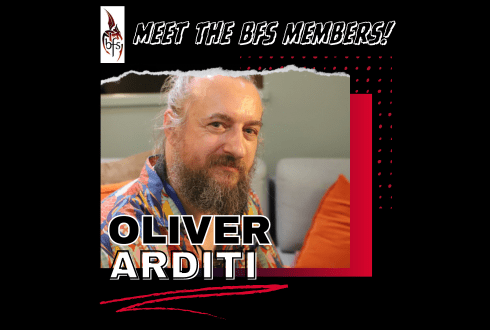
Meet Oliver Arditi
Every Friday, we meet a member of the BFS and peer deep into their soul (or, at least, a form they filled out). Want to be featured? Email us: online@britishfantasysociety.org
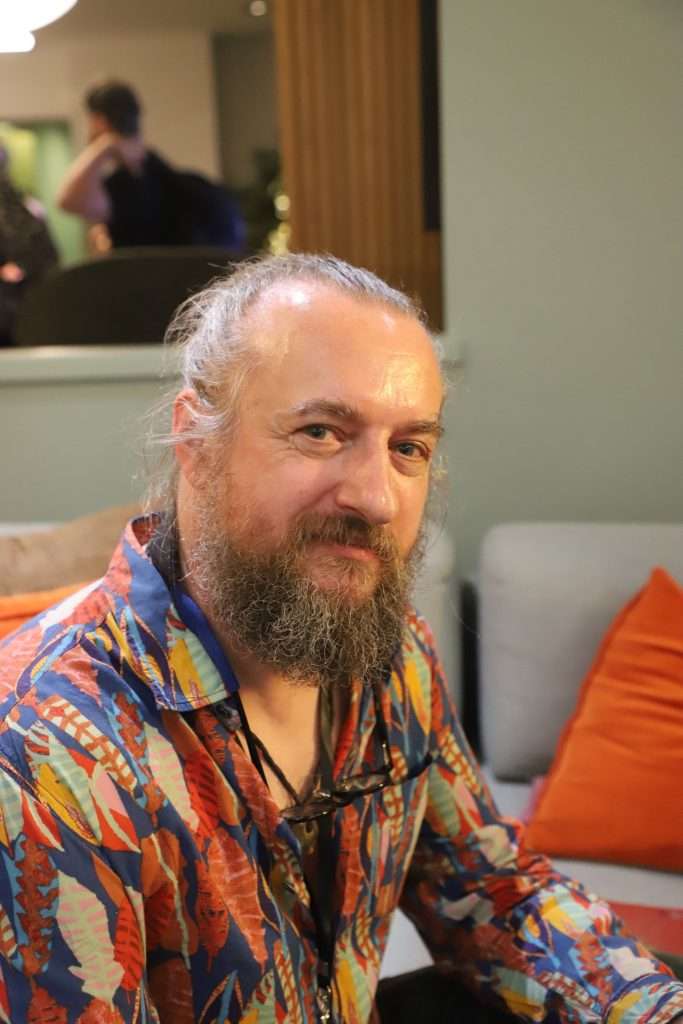
Name, including preferred pronouns:
Oliver Arditi (he/him—or anything you like, I’m not bothered about my gender, socially, biologically, grammatically or otherwise). You can call me Oli, or you can call me Oliver.
Which region are you based in?
East Anglia
If you write, which genre:
Any and all!
If you don’t write, what do you do?
I write but I haven’t published. I’m a librarian, a musician by training but no longer by inclination, and for the past 13 years I’ve been building a fantasy world, and spending enough time on it to call it an unpaid job. I’m also trying to do fandom related things in my region, having recently discovered the joys of going outdoors.
Are you drawn to any specific SFFH sub-genres?
I would say epic or high fantasy, but actually the only books I really love in those genres are by Tolkien and Le Guin. Other than that I’m pretty much genre indifferent—I’ve enjoyed more SF than anything else, but that’s just because I’ve found the most coherent and inventive worldbuilding in SF, and worlds are my jam.
Your influences
Tell us about the book/film/thing that got you into SFFH: What was it? How old were you? What impact did it have on you?
Bits of Tolkien, and all of the Earthsea books were read to me when I was far too young to grasp what was happening. Ever since then I’ve been aware that I can pass through portals into other worlds any time I want, and I worked out pretty early on (at 8 years old or so) that I could build my own portals too. The long term impact is that I find it very hard to believe in a secondary world unless it’s as plausible, beautiful and coherent as Middle Earth or Earthsea (or Frank Herbert’s Dune, which I read aged 12).
Below: photo of JRR Tolkien by Pamela Chandler, © The Tolkien Society; Photo of Ursula K Le Guin © William Anthony and taken from her website; Photo of Frank Herbert ©Byron Merritt and taken from the Macmillan website.
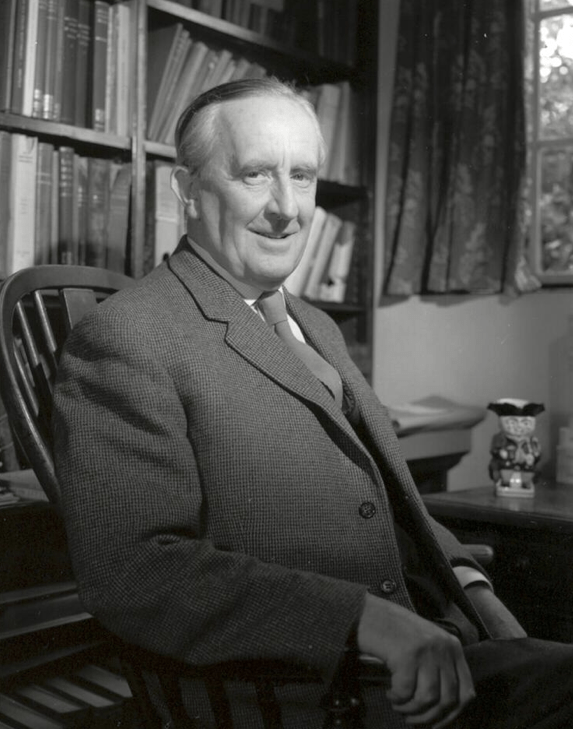

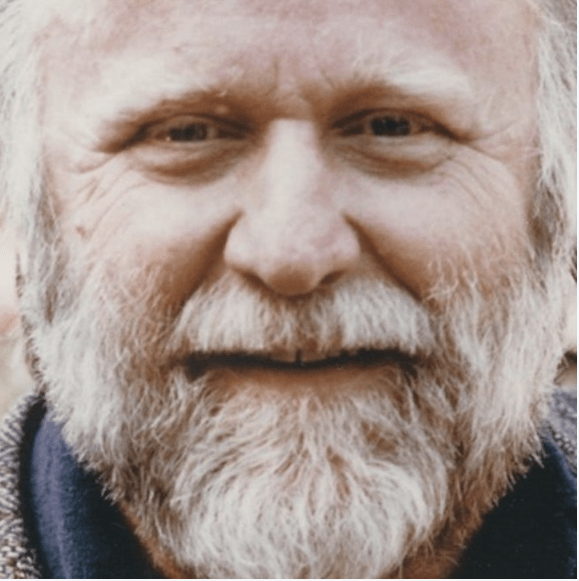
How does that early influence show up in your work now?
Precisely in the fact that my primary creative outlet is building worlds—constructing languages, drawing maps, writing mythologies and histories etc. When it comes to actually writing stories I’m influenced by Le Guin, but also hugely by J.L. Borges and Gene Wolfe, both of whom I came to in my teenage years, and who taught me to love being confused.
Where do you draw your creative inspiration from?
More or less everywhere! I read a lot of fairly obscure non-fiction which gives me thematic material, but what I really vibe with is atmospheres—particularly dark, complicated ones. Whether I find them in books, movies, games, music, landscapes, or just in my life experience is by the by. If I have the sense of an atmosphere, I can write a scene.
Also, other people. I did a creative writing MA with the Open University, and discovered how much of a support it is to be in contact with other writers and readers. That led to my discovering the existence of the British Fantasy Society, whose many, diverse, creative, geeky, intelligent and supportive members are the greatest inspiration I could imagine.
Who do you look to as a genre hero? Why?
The above-mentioned Le Guin and Wolfe (I can’t choose one and you can’t make me!). I want every paragraph I read to challenge my thinking, and to be made out of transcendentally beautiful prose. Nothing for me is more entertaining or escapist than thinking and feeling the things those two writers make me think and feel.
Your work
You’re stuck in an elevator for 60 seconds with that hero, and they want you to describe your work. Give us the pitch.
Well, they’re both dead, so I’d probably stay shtum and hold my nose.
If it was Le Guin I’d talk about worldbuilding, as she’s the only writer I know of who talks about Tolkien the way I think about Tolkien: “I’m building a world that is equal parts linguistic, mythopoeic and encyclopaedic, and that plunders most global cultures indiscriminately, but avoids seeming overtly like any of them.”
If it was Wolfe I’d talk about my novel in progress: “A coming of age story about two young people in a peaceful country, thrust suddenly into war and conflict. One becomes a warrior, and the other becomes a healer—the healer narrates both stories twenty years later, shaping the tale to suit her own mysterious agenda.”
What are you working on right now?
I have very, very, VERY nearly finished the first draft of the novel mentioned above, which is envisaged as the first of a trilogy, and will be the first of many novels set in my world (the Inner World, as I’m calling it this week). It may well not be the first thing I publish there, as I have some short stories in the oven too, and I am publishing a series on my blog which is also set in Ölnezea (as I was calling it last week).
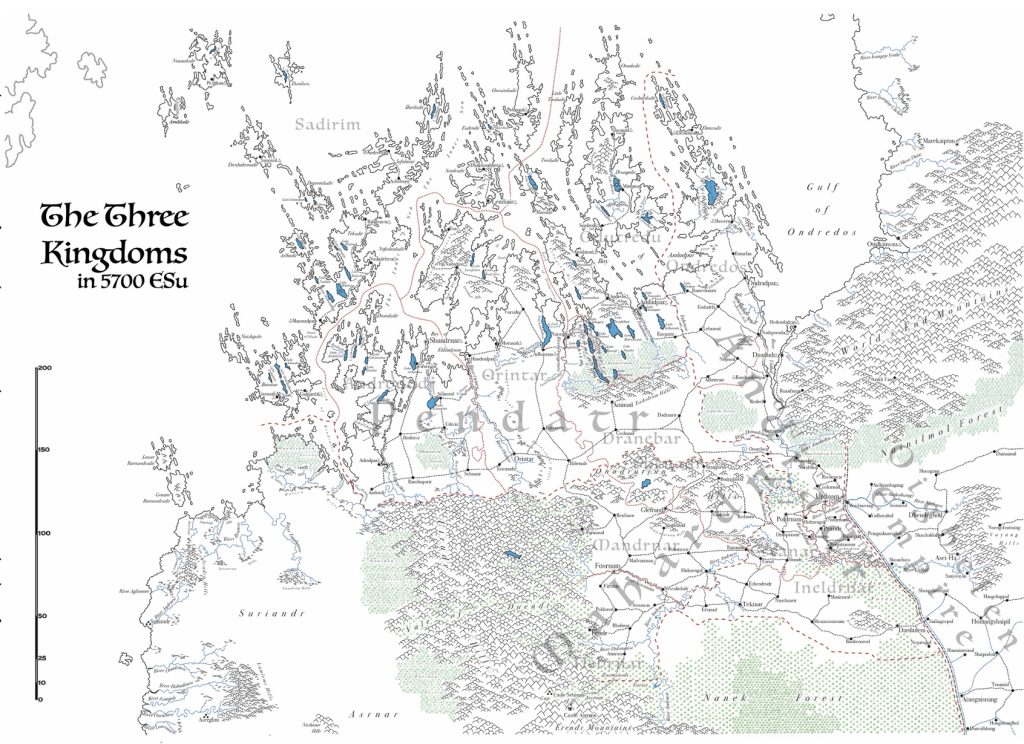
Thinking about all the stories/work you’ve done, what sticks out most in your mind? Why?
As I’m still unpublished this may be moot. I’m particularly proud of an alphabet I designed called ‘Tansek’, because it’s pretty (pictured in the image!).
Where and when do you create/are you at your most creative?
Headphones on, tunes blasting, laptop open—I can be anywhere. If I get stuck, I go for a walk in the woods.
What’s the best advice you’ve received about creativity?
All skilled work is equally creative: being an artist doesn’t make you special. I’m not sure who told me that. I may have made it up.
What’s your writing soundtrack?
I’m extremely eclectic in my listening, but I can’t listen to rap when I’m writing, and I find it hard to cope with noisy guitar music on headphones, so anything other than those. I’m a big fan of acoustic jazz and avant-garde prog, and most lyrics annoy me so instrumental music is generally my speed.
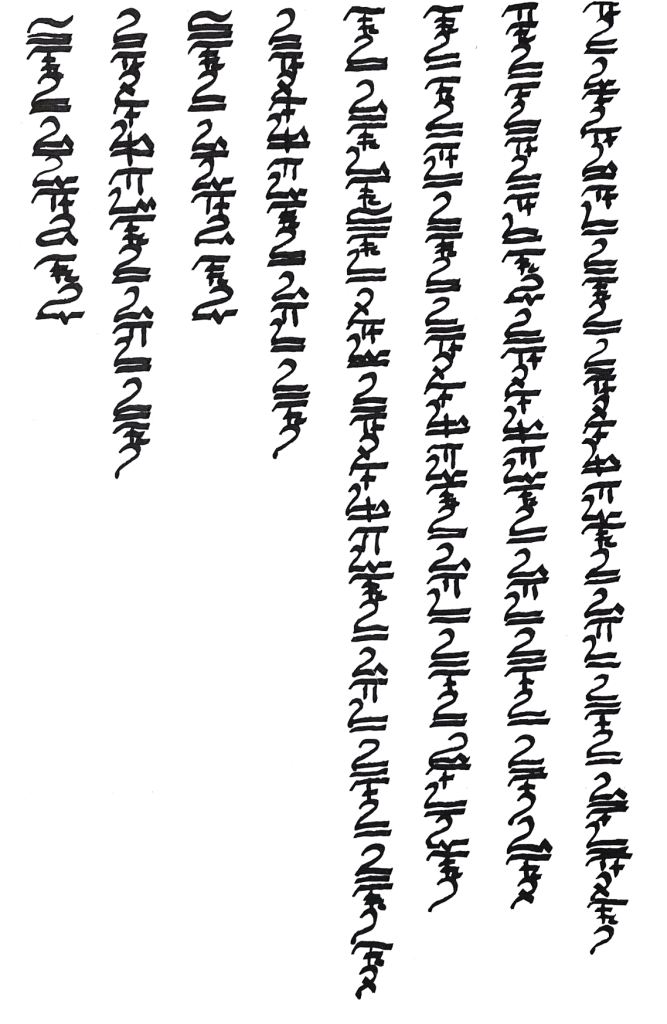
The quickfire round
Sci-fi, fantasy or horror?
Yes please!
Quiet or loud?
Quiet (but I also like loud).
Dark or light?
Dark (but I also like light).
Strict lines or genre blend?
Don’t care.
Awards or bestseller?
Seems implausible.
Fiction or non-fiction?
Fiction (but non-fiction is also fiction).
Poetry or prose?
Good prose is poetry.
Plotter or pantser?
A bit of both.
Reading or listening?
Reading (I’ve never listened to an audiobook or a podcast—mainly because I’d have to stop listening to music to do so).
Notebook or computer?
Computer.
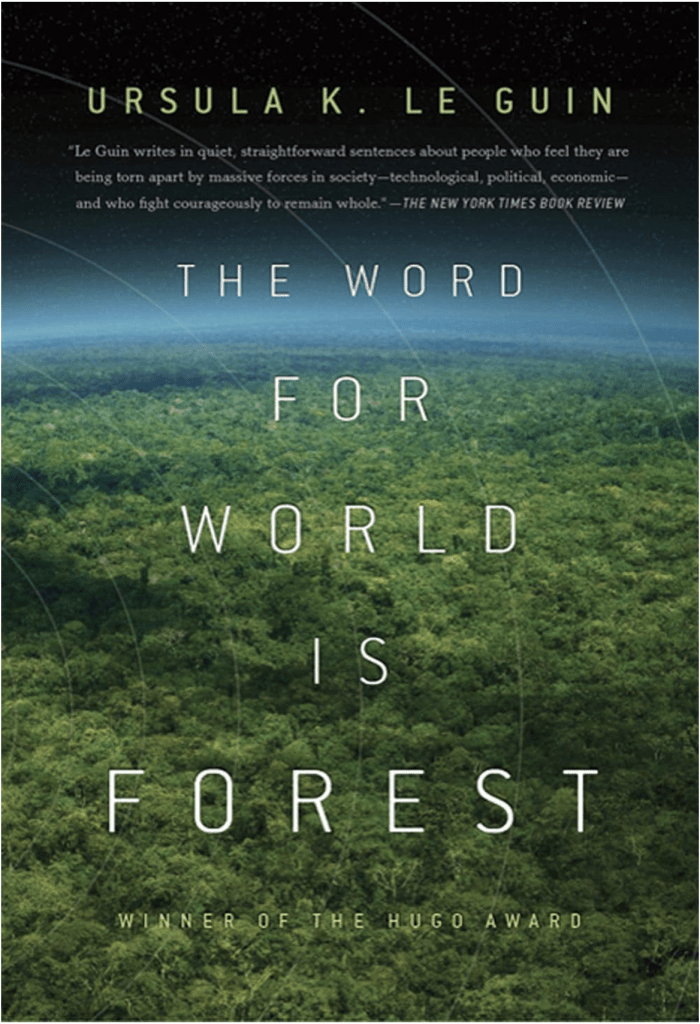
Favourite SFFH book of all time?
The Lord of the Rings.
Last book you read?
Ursula K. Le Guin’s The Word for World is Forest.
Any SFFH author on auto-buy?
Kim Stanley Robinson, Neal Stephenson, Alan Moore, Michael Moorcock, Margaret Atwood.
Favourite podcast?
When MP3 players first became available I started listening to music every minute I’m awake. Prior to that I listened to Radio 4 sometimes. Honestly I’d prefer it if people could just write things down!
The home stretch
What’s the best thing about being in the SFFH community?
However shit the world you live in, you can always visit a worse one, and for some bizarre reason that’s really fun.
Time to plug your stuff! Where can we find you and your work? What have you got coming up? Consider this your advertising space.
You can find me at oliverarditi.com, where I blog about writing/worldbuilding, and I post episodes of a grimdark fantasy series about a bunch of hapless mercenaries called The Blackswords. If anyone is ever silly enough to publish me, I’ll be bigging it up there.
I’m also trying to start an East of England affiliate of the BFS (and the BSFA, since we’re all in this together) called Eastworlds. We don’t have any particular online presence as yet, but there’s a mailing list, which you can join by emailing me at eastworlds@arditi.org.

Explore the blog:
Blog categories:
Latest Posts:
Tags:
#featured (56) #science fiction (25) Book Review (264) events (44) Fantasy (231) Graphic Novel (13) horror (136) Members (62) Orbit Books (48) profile (43) Romance (17) Science Fiction (50) short stories (28) Titan Books (52) TV Review (15)
All reviews
Latest Reviews:
- THE HOUSE ON THE BORDERLAND by William Hope Hodgson
- Monstrum by Lottie Mills
- Mood Swings by Dave Jeffery
- Yoke of Stars by R.B. Lemberg
- Hera by Jennifer Saint
- The Black Bird Oracle by Deborah Harkness
- RETURN OF THE DWARVES By Markus Heitz
- Delicious in Dungeon
- Toxxic by Jane Hennigan
- THIS ISLAND EARTH: 8 FEATURES FROM THE DRIVE-IN By Dale Bailey
Review tags:
#featured (2) Action (4) Adventure (4) Book Review (28) Fantasy (18) Featured (2) Feminist (2) Gothic Horror (3) Horror (14) Magic (3) Orbit Books (3) Romance (6) Science Fiction (5) Swords and Sorcery (2) Titan Books (7)